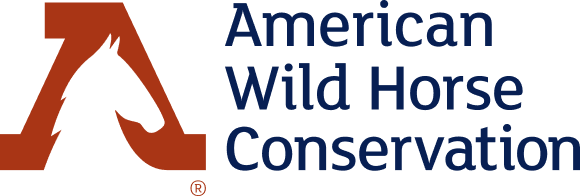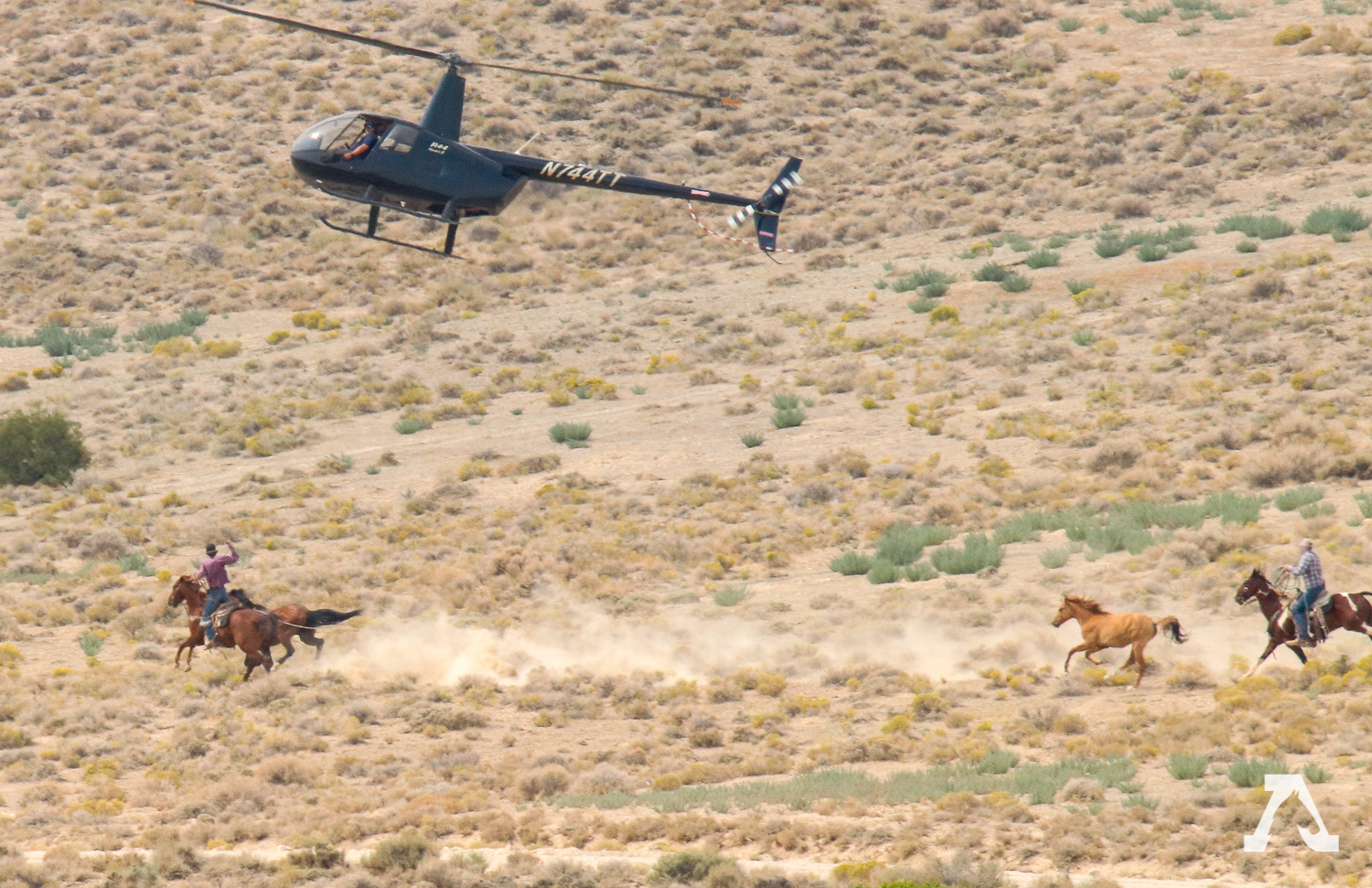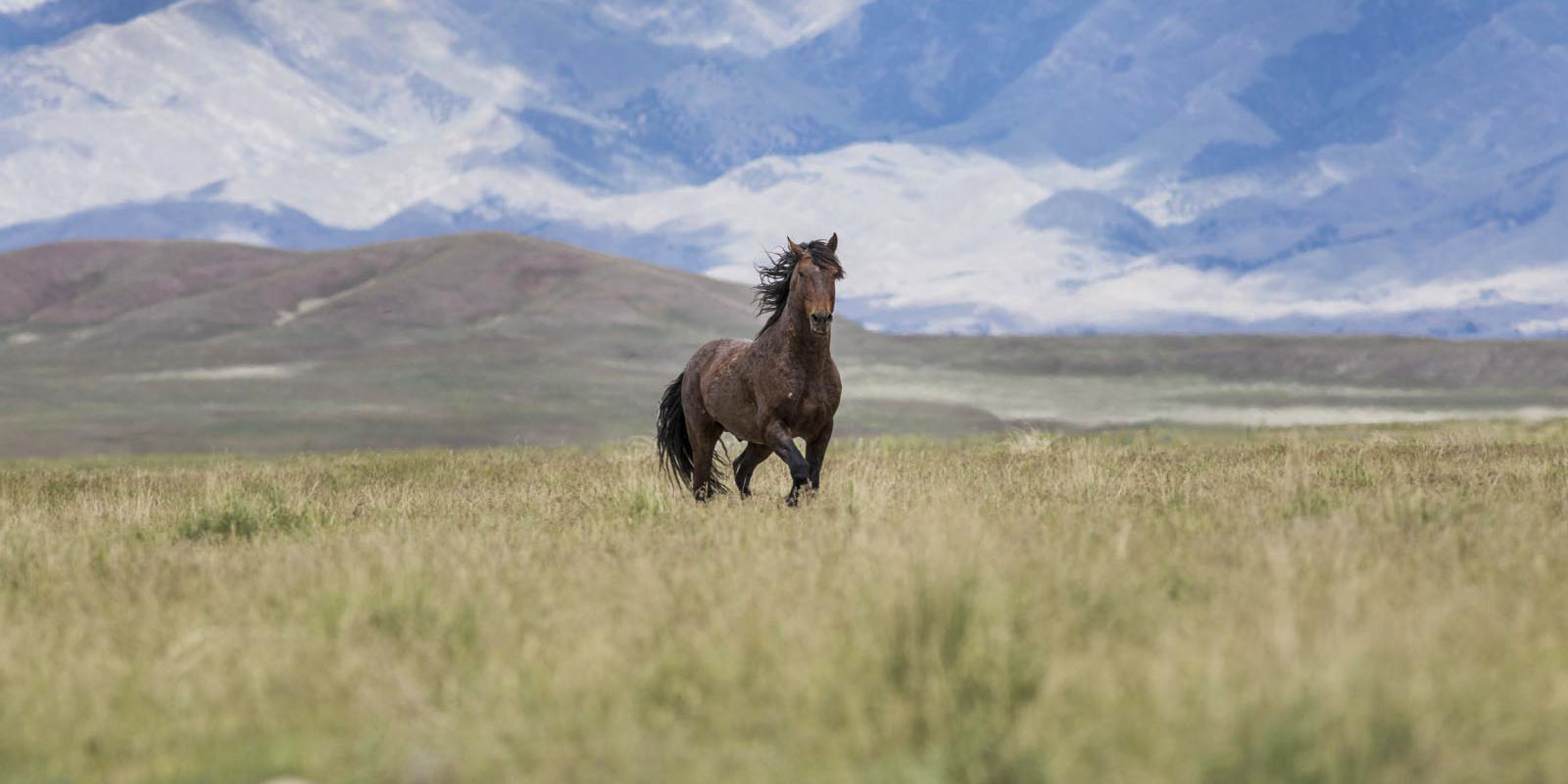Private livestock industry makes huge profits rounding up and removing protected horses from the range, analysis shows
WASHINGTON (Jan 25, 2022) — Rounding up wild horses on federal lands is big money for private livestock operators and costly to U.S. taxpayers, a new analysis by the American Wild Horse Campaign (AWHC) shows.
Using publicly available contract documents between private operators and the U.S. Bureau of Land Management (BLM), the AWHC found that livestock operators have earned:
- $53.2 million for helicopter roundup and bait-trapping operations since 2006.
- $87.0 million for short-term holding corrals since 2010.
- $333 million for long-term holding pastures since 2004.
In fact, the AWHC’s analysis shows that, for the last 10 years, livestock operators have received 89% of contract funds ($361,089,585 out of $405,734,931) paid out through the BLM’s “Wild Horse/Burro Control Services” budget.
The documents show private livestock companies making millions via their roundup contracts with the BLM. Examples include:
- Cattoor Livestock Roundup Company of Nephi, Utah, awarded $26,196,838 from 153 contracts with the BLM and $2,410,617 from 5 contracts with the USFS, including contracts that extend through 2025.
- Sun J Livestock of Vernal, Utah, awarded $9,993,939 from 34 contracts with the BLM and $574,342 from 1 contract with the USFS since 2010, including contracts that extend through 2025.
- Shayne F. Sampson of Meadow, Utah, awarded $4,927,430 from 37 contracts with the BLM and $39,529 from 1 contract with the USFS since 2012, including contracts that extend through 2025.
Private businesses that provide short-term holding corrals for wild horses removed from the range also make millions, the report shows. Examples include:
- Indian Lakes Holding Facility, in Fallon, Nev., operated by Broken Arrow Horse & Cattle Company, awarded $39,166,063 from 11 contracts with the BLM since 2010.
- Axtell Off-Range Corrals in Axtell, Utah, operated by Kerry M. Despain, awarded $17,482,062 from 13 contracts with the BLM since 2012.
- Simplot Livestock, Bruneau Off-Range Corrals, in Bruneau, Idaho, operated by J.R. Simplot, awarded $16,410,175 from 7 contracts with the BLM since 2015.
- Sutherland Off-Range Corral in Sutherland, Utah, operated by G&R Livestock Inc., awarded $3,770,200 from 3 contracts with the BLM since 2020.
Of the 18,891 horses and burros in short-term corrals as of November 2021, 5,571 are stored in these private facilities.
Conditions at these short-term holding facilities are notoriously harsh: crowded feedlot pens that offer little to no shelter from extreme summer heat or winter winds, snow, and cold.
In addition to these short-term corrals, the BLM ships horses to 42 privately owned long-term holding corrals, including:
- Drummond Land & Cattle Co. ($33,871,726; 19 contracts);
- 20 West LLC ($25,068,980; 11 contracts);
- Grand Eagle Summit, LLC ($22,983,343; 14 contracts);
- Tadpole Cattle Co Inc. ($22,175,928; 7 contracts); and
- Hughes Cattle Company ($18,221,663; 13 contracts).
The same person—Robert S. Hughes II—owns both Tadpole Cattle Co Inc. and Hughes Cattle Company, thus collectively earning $39,964,983 from 19 contracts.
Roundups also benefit private livestock operators who graze their cattle on leased public lands where horses also roam, the AWHC says.
The ranchers get access to this public land cheap, thanks to government subsidies. For example, the cost of grazing a single cow-calf pair on private land in the West is about $23 per month. But the grazing fee for a cow-calf pair on leased public land is $1.35 per month. As a result, the BLM’s grazing program loses millions of dollars each year. In fiscal year 2017, the bureau spent $79 million on the grazing program but took in only $18.3 million in grazing fees.
The livestock industry uses this big money to press the BLM for further roundups, ballooning the BLM’s Wild Horse and Burro Program budget from $19.8 million in 2001 to $116 million in 2021, despite critical reports from the National Academy of Sciences, General Accountability Office, and the Office of Inspector General that have labelled the program as costly, inefficient, and ineffective.
In addition to the wild horse program, the livestock industry benefits from a $133 million predator control program within the USDA that lethally removes mountain lions, wolves, coyotes and other animals for the benefit of cattle and sheep grazers.
“This giant federal entitlement program is funneling hundreds of millions of our tax dollars annually to the livestock industry at the expense of wild horses, burros, other wildlife and our public lands,” said Suzanne Roy, executive director of the AWHC. “It’s time to end this government waste and require humane, cost-effective and scientific management of our federally-protected wild horses and burros, which 80 percent of Americans want to protect.”
The National Academy of Sciences in a BLM-commissioned report noted that the bureau doesn’t use science when determining how many wild horses should be allowed to roam the range, and it called on the BLM to use humane fertility control to manage horse populations instead of roundups. The cost to dart a mare with the safe and effective PZP vaccine to prevent pregnancy according to the BLM is $220, while the agency states that the cost to roundup a horse from the range and warehouse it for life is up to $50,000.
Please contact AWHC for further information on these findings. You can see more information from AWHC’s analysis here.
About the American Wild Horse Campaign
The American Wild Horse Campaign (AWHC) is the nation’s leading wild horse protection organization, with more than 700,000 supporters and followers nationwide. AWHC is dedicated to preserving the American wild horse and burros in viable, free-roaming herds for generations to come, as part of our national heritage.
###


